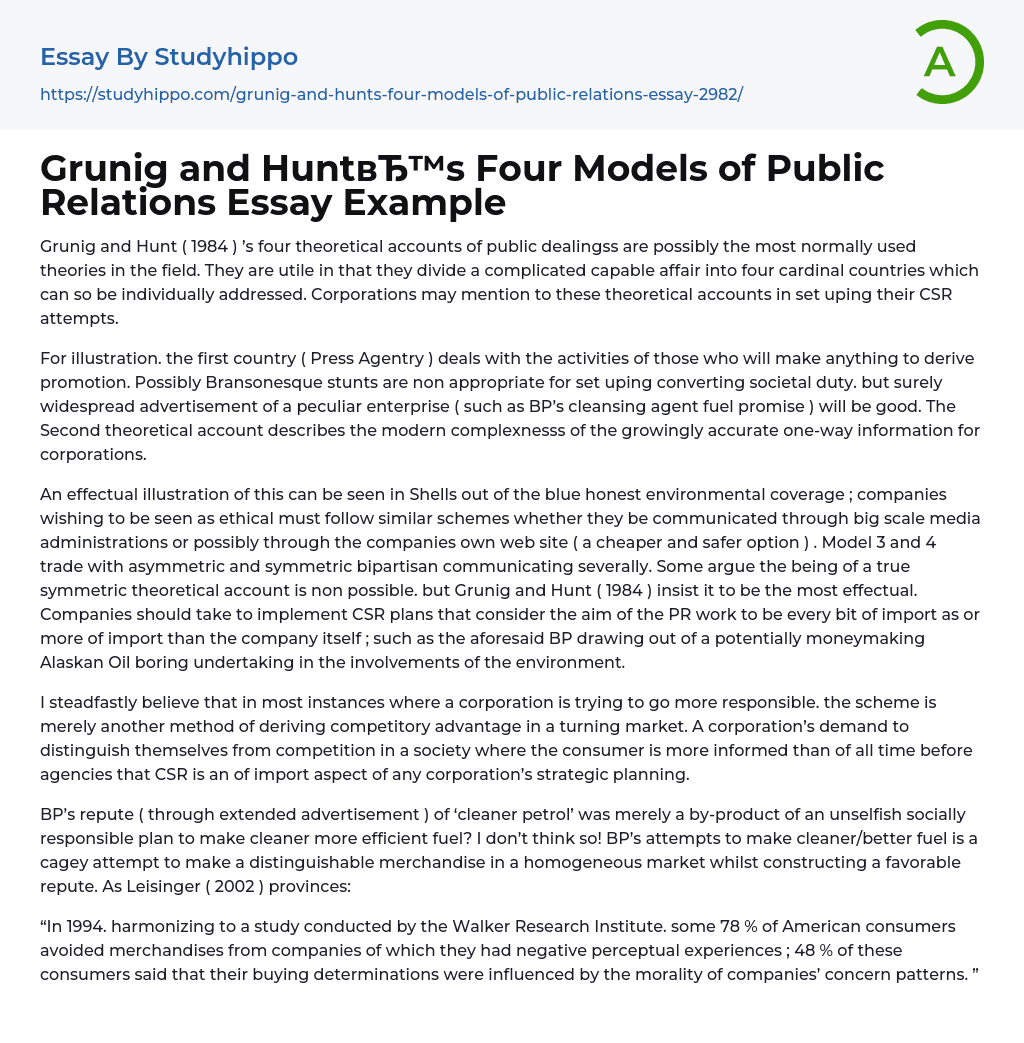The four theoretical accounts of public relations developed by Grunig and Hunt (1984) are widely used in the field, as they help to simplify complex subjects into four key areas that can be addressed independently. These models can be used by corporations when establishing their CSR efforts. For example, the first area, Press Agentry, deals with promoting activities that gain attention, such as widespread advertisement of a specific project (like BP's cleaner fuel promise). While Bransonesque stunts may not be appropriate for establishing socially responsible practices, a broader approach can be valuable. The second model addresses the complexities of one-way communication for modern businesses. An excellent example is Shell's surprising commitment to environmental transparency. For companies desiring an ethical reputation, similar strategies must be employed, whether they are communicated through major media outlets or the
...company's website (a cheaper and safer alternative). Models three and four—Asymmetric and Symmetric Bipartisan Communication—deal with different communication styles. While some suggest that a truly Symmetric model is impossible, Grunig and Hunt (1984) maintain that it is the most effective.It is essential for companies to implement Corporate Social Responsibility (CSR) plans that prioritize the aim of PR work as equally or more important than the company itself. An example of this is BP's decision to withdraw from potentially profitable Alaskan Oil drilling in favor of protecting the environment. I firmly believe that when corporations aim to become more responsible, it is often a strategic move to gain a competitive advantage in a growing market. In today's society, where consumers are well-informed, CSR is a significant aspect of any corporation's strategic planning as it distinguishes a company from its competitors. BP'
reputation for "cleaner petrol" was not a mere by-product of a selfless socially responsible plan to create cleaner fuel; it was more so an intentional effort to build a favorable reputation while creating a distinct product in a similar market. As Leisinger (2002) noted, consumers tend to avoid products from companies with negative reputations, and their purchasing decisions are influenced by the morality of a company's business practices.
- Advertising essays
- Audience Theory essays
- Competitor Analysis essays
- Consumer essays
- Marketing Management essays
- Marketing Mix essays
- Marketing Plan essays
- Marketing Research essays
- Marketing Strategy essays
- Point Of Sale essays
- Price essays
- Procurement essays
- Product essays
- Product Differentiation essays
- Promotion essays
- Promotion And Marketing Communications essays
- Retailing essays
- Trademark essays
- Anheuser-busch essays
- Brands essays
- Detergent essays
- Product Placement essays
- Research Design essays
- New Product Development essays
- Advertisement essays
- Brand essays
- Sales Promotion essays
- Advertising campaign essays
- Consumer behaviour essays
- Offer And Acceptance essays
- Wal-Mart essays
- Discover essays
- Accounting essays
- Andrew Carnegie essays
- Automation essays
- Business Cycle essays
- Business Intelligence essays
- Business Model essays
- Business Operations essays
- Business Software essays
- Cooperation essays
- Cooperative essays
- Corporate Social Responsibility essays
- Corporation essays
- Customer Relationship Management essays
- Family Business essays
- Franchising essays
- Harvard Business School essays
- Harvard university essays
- Human Resource Management essays




